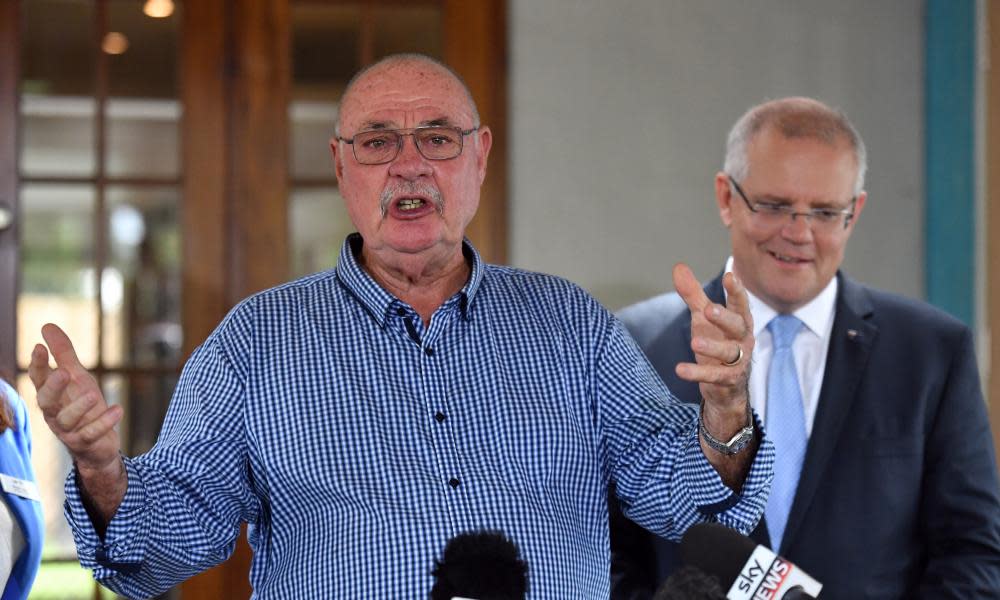Liberal MP Warren Entsch urges Coalition to adopt net zero emissions target by 2050

The Morrison government’s special envoy for the Great Barrier Reef, Warren Entsch, has called for the Coalition to adopt a net zero emissions target by 2050, and endorsed the prime minister’s recent signal that Australia could meet the 2030 target without needing to use carryover credits.
During Tuesday’s Coalition party room meeting – the second-last parliamentary gathering for 2020 – Entsch said the government should adopt the net zero target during a contribution where he called for targeted intervention to ensure people in north Queensland were able to access affordable insurance for cyclone events.
The prime minister has gradually warmed up on the government adopting the mid-century target following the victory of Joe Biden in November’s presidential contest, but Scott Morrison is continuing to argue Australia will not make the 2050 commitment until he can outline the costs.
Related: Cooling La Niña may not save Great Barrier Reef from mass coral bleaching, experts warn
Entch’s declaration was prompted by a contribution by the Queensland LNP senator Gerard Rennick, a critic of renewable energy. Rennick said the government should use carryover credits to meet its 2030 target, even though Australia has been blasted by other countries for signalling that intention.
The trigger for Rennick’s contribution was a recent speech by the prime minister. Morrison told business leaders last month that Australia may not use carryovers – a controversial accounting mechanism from the Kyoto period – to meet the 2030 target, because he was “confident our policies will get this job done”.
But Rennick told Tuesday’s party-room meeting the government should deploy carryovers to meet the target because Australia was entitled to use that accounting method.
Entsch countered by telling colleagues he was encouraged by Morrison’s recent signal on meeting the 2030 target without deploying the Kyoto-era accounting concession, and added: “While we are at it, we should be adopting net zero by 2050.”
Entsch told the Coalition party room that when it came to climate action, Australia should be seen as leaders and not “reluctant followers”.
The veteran north Queensland Liberal later told Guardian Australia his political movement was a broad church, and it was important to represent the spectrum of views that existed inside the government. He said it was important to hear from supporters of climate action, not just internal critics.
Entsch noted that Australia had managed the Covid-19 pandemic effectively because the government had followed scientific evidence, and the same rationale applied to climate action. “If there’s anything positive we can take out of Covid, it’s that: let’s follow the science and ignore the fringe views,” he said.
Related: Plan to bulldoze almost 2,000 hectares of land in Great Barrier Reef catchment rejected
The special envoy for the Great Barrier Reef said he had had access to the best scientific advice since assuming that environmental responsibility within the government. The government was well served by experts, he said, so it was incumbent on the Coalition to listen to them, as the government had during the pandemic.
Separate to the exchange between Rennick and Entsch about carryovers and net zero, two Nationals – Matt Canavan and Barnaby Joyce – and the New South Wales Liberal Craig Kelly also used Tuesday’s party room to blast a recent commitment by the NSW government to build 12 gigawatts of clean energy.
That commitment is roughly equivalent to the country’s entire existing large-scale renewable capacity. The NSW policy also includes constructing 2GW of energy storage in the state over the next decade.
Canavan, a prominent supporter of new coal-fired power, told Tuesday’s meeting the NSW policy was at odds with federal energy policy.
Kelly, meanwhile, declared the NSW plan – led by the state Liberal government with multi-party support – would drive coal out of the system before battery technologies were capable of firming the grid.

 Yahoo Movies
Yahoo Movies 
